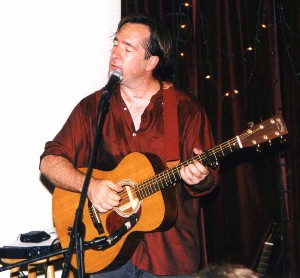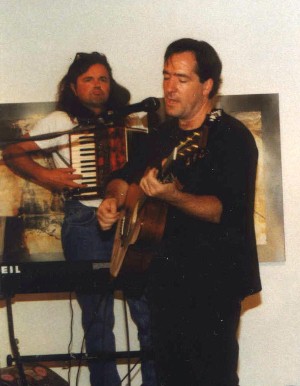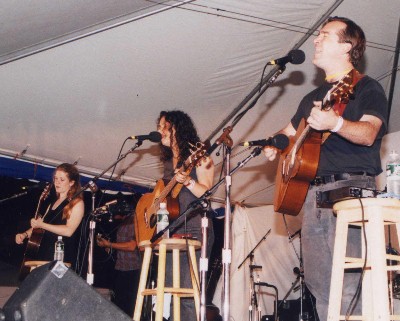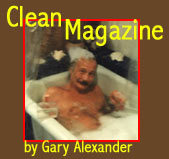|
A special Wednesday night appearance, September 26th [2001], at
The Rosendale Cafe...
Celebrated performing songwriter Richard Shindell, who moved to
Argentina last year with his family, has arrived for a nine-show tour of
the Northeast. Rather than entirely composing his performance of his own
tunes, he plans to comfort the evening with a selection of songs
familiar to most American audiences. Come early...
|

"Ghostchaser at Rosendale Cafe"
Story by Gary Alexander
Photos by Ray G. Ring IV
It's
not just that line of vague blue phantoms moving against the sky
like refugees at twilight, it's shadow and innuendo, you see?
You're sitting shotgun in Richard Shindell's parked car as he
plays you a rough-mix tape of his just-written, just-recorded song,
"Wisteria," and you're trying to get past the stirring beauty of the
melody and the verbal images playing out on that haunting balladeer's
voice to distill precisely what he's saying here. The song recounts a
visit to a place he once lived and offers homage to an eave-encircling
vine which the new tenants have seen fit to remove. Shindell is allowing
you a sniff of its springtime blossoms, a glance at the reassuring
winter-starkness of its snaking form, the multi-drip summer rain pattern
forming on its winding twists, the orange-burnished, fallen sycamore
leaves caught in its autumn web and a past-anger, hollow feeling of
mournful resignation costumed in aching sound... And it strikes
you...This is a protest song.
"Wisteria" saw its first public performance that night, last
year, at the Rosendale Cafe, where its author returns for an encore on
April 21st. It now graces a breath-catching list of tunes on his new cd,
Somewhere Near Paterson
and it also serves as a key to critical insight
into the mind and music of Richard Shindell.

Roamin' Radoslav with Richard
at Unison Arts Center, New Paltz
|
Consider the cd title, taken from a tune thereon called
"Transit," wherein a flow of road-ragers on the New Jersey Turnpike
swerve around a nun changing a tire and off, past their exits, into
oblivion as the nun finishes her task and continues on to coach a choir
rehearsal of prison inmates whose voices join in transcendence of their
surroundings. Here is a snapshot of the songwriter, the only still and
focused figure in a frame ablur with frantic RUSH. Like the white-suited
human in a short film of the 60s called
The Existentialist
by Ed
Emshmiller (then better known for his cover paintings on science fiction
books and magazines), the only figure striding forward in a city of
people walking in reverse.
This is at the center of Shindell's art as he surveys our
contemporary situation from a perspective which is a blessed step
removed. In "Abuelita," he sketches the thoughts of a woman in the
crowd whose son and daughter-in-law have been "disappeared" and raises
her twig of hope aloft as she scans the passing faces for a sign of her
stolen granddaughter. His "You Stay Here" never makes a backdrop of war
overly obvious as its economic signals whisper to stay by the fire and
"I'll go look for coats/There may still be/Some out on the road/We'll
wash them clean with melted snow/The kids don't ever have to know..."
There is no self-pity or moral outrage in such an unspoken protest;
merely a gesture which signifies awareness of immediate necessities and
circumstance, implying the rest. It is the kind of comment which strikes
deeper than outrage.
"Waiting for the Storm" is cast in the related landscape of
obstinacy and apprehension, poised in a rocking chair more substantial
than an inrushing reality which has evacuated the determination of all
others. "Grocer's Broom" closes the last mom and pop store of the
neighborhood to rising rents and the monied sweep of change and follows
the tired steps of its beloved proprietor into a dark living-room of
forced retirement. Turn that key we found above and you can how this
master painter of scenes strokes his canvases of song.
At first glance, there's a certain ambiguity to
Shindell's tunes which stretches their horizons. Underneath, at the
core, they are quite specific but specific in a different way. Shindell
is a detector of psychic emotion. He traces the intersection of thought
and feeling at highly-charged moments of stress and distraction,
ignoring the petty linear details of rational consideration, and
musically explores these indelibly potent pockets of experience.

Dar Williams, Lucy Kaplansky and Richard Shindell
perform at Falcon Ridge 2000 as the trio Cry Cry Cry.
|
There are theories which seek to explore ghosts as the psychic
residues of human stress staining the electromagnetic signature of a
place, embedding into the physical soul of its metal or wood and
replaying like sound on tape when the proper impetus presents itself.
Shindell finds the most poignant and unusual of these subtle cues and
collects them into repertoire.
It's a very mystical thing to do and
that, in essence, is how he functions as he does. And why not? He,
himself, still bears the faint residue of his days at Union Theological
Seminary in Manhattan, way back when, and, even if he found priesthood
in contemporary established religion somewhat less mystical than he
expected, he retains the vital remnants of the mystic's sense which
first perceived the calling and applies it in no less worthy fashion,
calling himself a "misanthropic ex-seminarian lapsed-Buddhist Agnostic
for Jesus." A line, needless to say, reviewers love to quote.
Somewhere between Abraham H. Maslow's
Religions, Values and Peak-Experiences
and Todd Gitlin's
Twilight of Common Dreams,
Shindell
is gathering the blossoms for his next bouquet. With eyes that see
through fleshy matters and fingers that pick into the heart, he
illustrates with mute objections of the self-evident invisibly binding
his compositions together.
If you visit his website at
www.richardshindell.com,
you'll
see Richard doesn't often get over our way, so here's an opportunity to
catch an extraordinary talent in the flesh and spirit of the moment.
-Gary Alexander
Gary Alexander
is an independent journalist and scholar whose focus of
interests range through a variety of disciplines. Under various names,
he has written (and ghost written) upon history and current event;
science and technology, as well as music and the arts in books and for
national periodicals. While particularly attentive to the subtle and
complex impact upon cultural imagination and contemporary structures of
presumption which activity in the above mentioned topics tend to have,
Alexander treats his topics with a slightly more than occasional resort
to humor.
Posted on September 21, 2001
|

